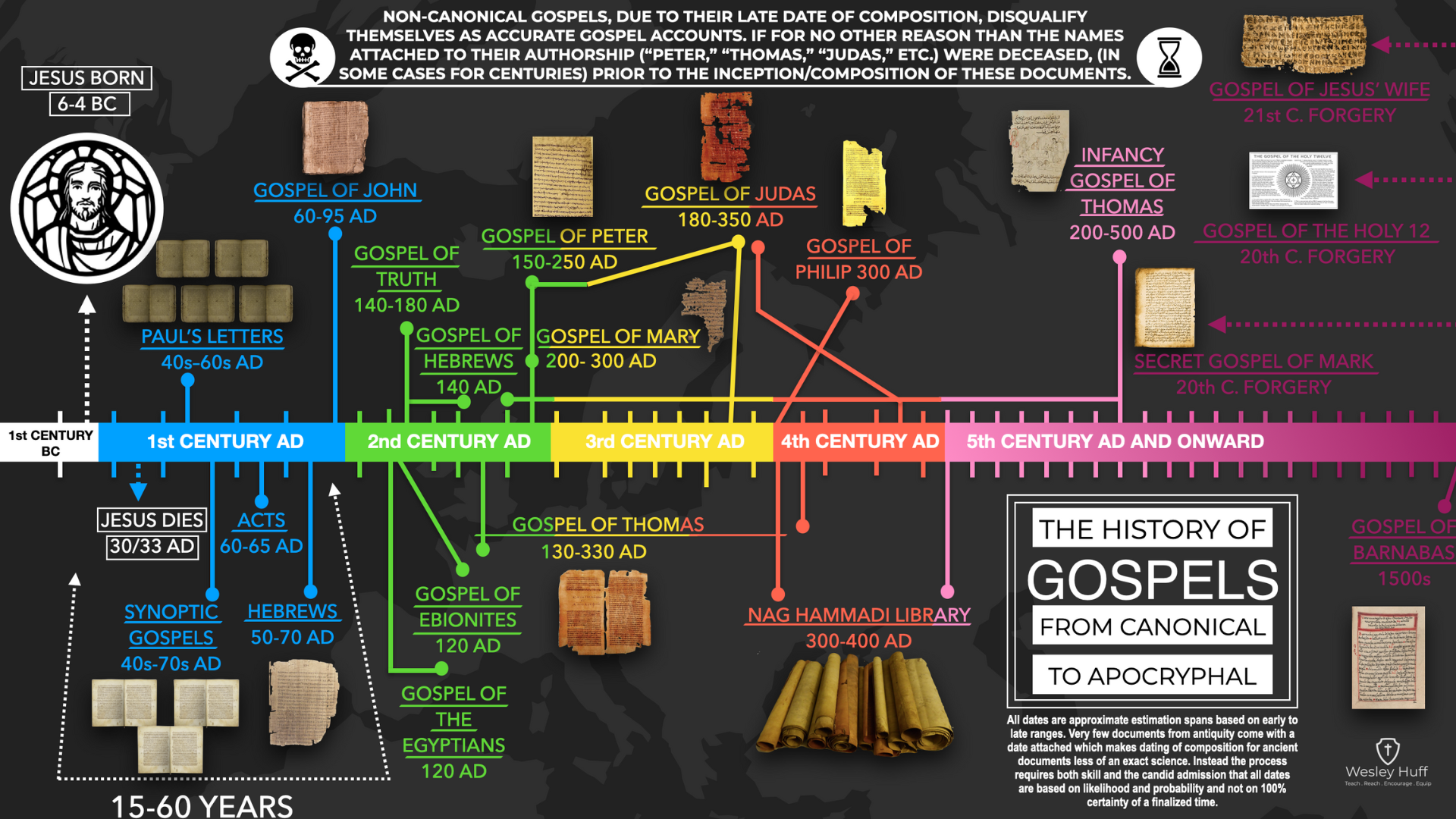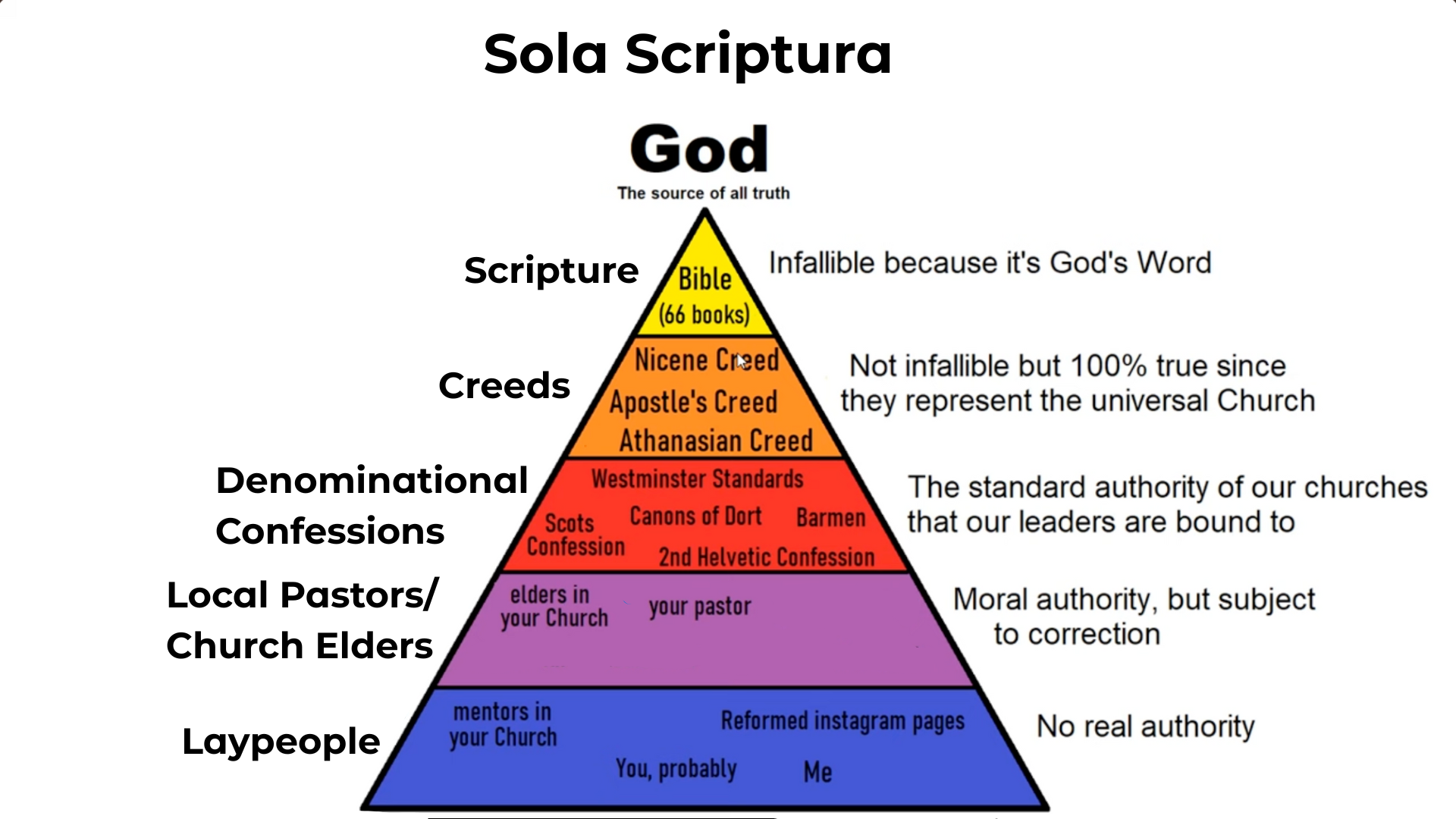Why should I trust the Bible?
The answer cannot ONLY be:
- Because God says so
- Because the Bible says so
- Because My pastor says so
- Because my mama says so
Parts to making this decision
Trusting the Design
Trusting those who have come before
Trusting the design = All the engineers and builders knew what they were doing
Trusting others = They didn’t die when they rode it
We are going to approach our question the same way
1: Trusting The Design
What is the Bible?
The Bible is a collection of 66 books, written over a period of roughly 1,500 years by approximately 40 different authors
How do we know we can trust the Bible?
Common Objections:
Isn’t the Bible like a 2000-year-old game of Telephone?
How can we know?
First, when was the NT written?
- All written between 15-60 Years After the Life of Jesus
Timeline of the New Testament

Why this Matters…
Alexander the Great (died 323 BC)
- Earliest surviving biography:
- Plutarch (~400 years later)
Arrian’s account: ~450 years later
Julius Caesar (died 44 BC)
- Suetonius wrote ~160 years later
- Plutarch ~150 years later
Tiberius Caesar (Emperor when Jesus died)
- Tacitus wrote about him ~80 years later
- Considered highly reliable
Buddha (died ~480 BC)
- First written accounts: ~400 years later
- Oral tradition until then
If we can’t trust the New Testament because 30-60 years is ‘too long,’ then we literally can’t know anything about ancient history
- But we trust Alexander’s biography written 400 years later!”
Next objection…
How can we know we have ACCURATE COPIES of what was written?
- It’s been to long to preserve what was originally written
1: We have over 5,800 Greek NT manuscripts and fragments
- (most ancient works have 10-20)
2: Some fragments date within 50-100 years of the originals
3: The Dead Sea Scrolls showed our Old Testament was virtually unchanged over 1000+ years
What this means…
99% of the Biblical text is settled
- It is reliable and the same as 2000 years ago
There are about 400,000 textual variants across these manuscripts
- Most are spelling differences, word order, or obvious scribal errors
But we can be certain that…
NO MAJOR DOCTRINE IS AFFECTED OR IN QUESTION
Another objection…
But what about the scientific and Historical Inaccuracies?
When you open your Bible today, you’re reading the most well-documented, carefully preserved ancient text in human history – and it’s not even close
This means…
The Bible in your hands contains the actual words of people who walked with Jesus, touched Him, and watched Him rise from the dead – and we can prove it.”
2: Trusting those who have come before
Paul wrote…
2 Timothy 3:16-17
16 All Scripture is inspired by God and is profitable for teaching, for rebuking, for correcting, for training in righteousness, 17 so that the man of God may be complete, equipped for every good work.
How has the Bible changed people throughout history
- Changed Empires
- Changed lives
What does this mean?
Reading the Bible changes people
Significant study about 10 years ago showed…
For those who read their Bible AT LEAST 4 DAYS a week or more:
- Feeling lonely drops 30%
- Anger issues drop 32%
- Bitterness in relationships drops 40%
- Alcoholism drops 57%
- Sex outside of marriage drops 68%
- Feeling spiritually stagnant drops 60%
- Viewing pornography drops 61%
- Sharing your faith jumps 200%
- Discipling others jumps 230%
Before we close this point, I want to take a look at HOW scripture should be read and interpreted
Scripture should not be interpreted ALONE…
Sola Scriptura – Scripture alone
- The Bible alone is the ultimate authority in matters of faith and practice.

Authority Chain for scripture and Interpretation of scripture
God – Source of All Truth
- Gives us his word (Bible)
Scripture – Infallible
- The Bible God intended us to have
Denominational Confessions – Authority, church, and leaders are bound to
Local Pastor/Elders – Moral Authority
Laypeople – No real authority
3: Trusting it for yourself
Psalm 119:105
Your word is a lamp for my feet and a light on my path.
Without scripture influencing your life, you are walking in the dark
“I have to” vs “I get to”
Additional Resources:
Right now media: https://app.rightnowmedia.org/en/user/MyCornerstone
Christian Apologetics (Wes Huff)

